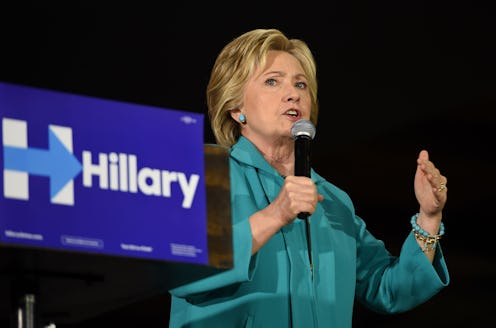News
What Does Hillary's WA Primary Win Mean?
On Tuesday evening, the Democratic party saw yet another strange, illuminating scene play out in the Pacific Northwest, and it's one that might leave you scratching your head. That's because it was the day of Washington state's non-binding presidential primary, a chance for citizens of the Evergreen State to cast their votes, even though it was effectively just a symbolic gesture ― the Washington caucuses back in March decided the delegates, and Bernie Sanders won by a landslide. So, then, what does Hillary Clinton winning Washington's primary mean, just months after she got whacked there by more than 40 points?
There are a couple ways to look at it. On the one hand, you could say that this shows that Sanders' claims of momentum are misleading, or at the very least, that Clinton has some momentum of her own — that Washington's Democratic voters have come around to her in a big way as the race winds down, turning a defeat of more than 40 points (Sanders nabbed 74 of the state's delegates to Clinton's 27) into a solid-yet-irrelevant victory.
But that overlooks the more obvious, simplest explanation: the reason Sanders won the caucuses in March then Clinton won the primary in May is because caucuses require voters to carve out hours from their day and participate in a communal, non-private, potentially argumentative process, a much higher bar for civic involvement than simply casting a traditional, secret ballot.
As such, the candidate with the base that skews younger, more passionate, and more willing to argue it out in a public setting is going to have an edge, and that's Sanders' base in a nutshell. This isn't the first time there's been a glaring divide like this, either — Sanders also won the Nebraska caucuses by about 14 points in March, only to lose the state's non-binding primary to Clinton months later by a whopping 19 points.
What's startling about this? It's not that Sanders necessarily has anything to apologize for — both candidates know the electoral landscape heading in, and if he wins delegates through caucus states, well, that's how it works! There's nothing underhanded about that, and make no mistake, if Clinton were racking up the caucus wins, she wouldn't be apologizing or protesting.
But it does raise a startling question, if the "will of the people" interests you: is Sanders' candidacy, already flagging badly behind Clinton's in both the popular vote and pledged delegates, less competitive than it seems to be? So far, he's won 20 state contests overall, with slightly more than half of them (11) coming through caucuses. Comparatively, Clinton has a far better record in the primaries — she's won 26 U.S. states so far, and all but two of them held primaries (she won the Iowa and Nevada caucuses, as well as non-state caucuses in Guam, American Samoa, and the Northern Marianas).
It'd be fascinating to see what would happen if all the caucus states Sanders won held these sorts of non-binding primaries. Especially considering just how drastically the margins in Nebraska and Washington swung, a difference of about 33 points in the former, and a staggering 52 points in the latter. If even victory margins like those can evaporate simply by letting more Democratic voters participate, it's hard not to imagine that a caucus-free race would've turned out radically differently.
Because while it's an admittedly small sample size, the only two states that have done this have demonstrated that the more democratic primary system favored Clinton, and to a huge extent. Simply put, if primaries were used universally throughout the states, you might be seeing Clinton forging the kind of dominant path many political observers anticipated before it all began, rather than fending off such a stout challenge from Sanders' vibrant grassroots campaign.
It doesn't appear as though Sanders' caucus-state dominance is going to matter in the end, however — Clinton boasts a nearly insurmountable 271 pledged delegate lead with just six states left on the schedule. Sanders doesn't seem ready to stop fighting, however — he's repeatedly stressed that he plans to take his campaign all the way to the Democratic National Convention in July.
